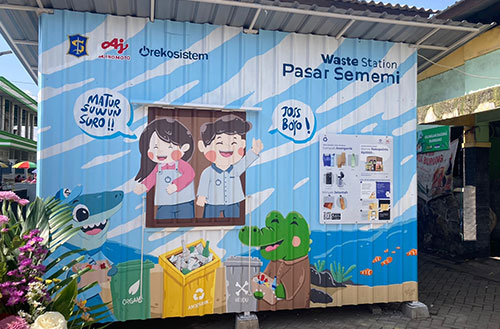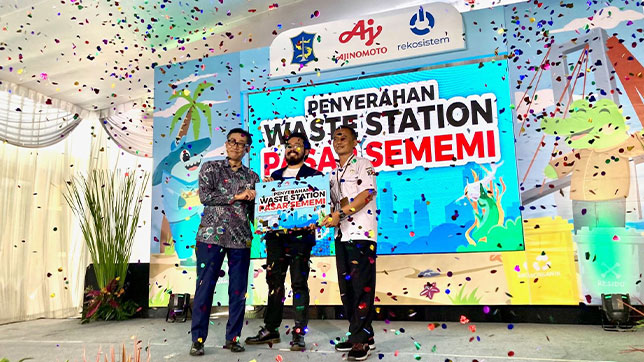Along with society
Developing Waste Collection and Recycling Systems

Plastics are widely used in products, containers, and packaging due to considerations of light weight, durability, and ease of processing compared to other materials. At the same time, most plastics remain in the environment without decomposing naturally, becoming a source of serious environmental pollution. In particular, plastic waste that flows out to sea (marine plastic) is carried great distances by tides and wind. This marine plastic has a negative impact on the ecosystem over wide-ranging areas.
The Ajinomoto Group set a goal to reduce the amount of unused plastics entering the environment to zero by fiscal 2030. We are pursuing a variety of strategic efforts to achieve this goal. In December 2022, PT AJINOMOTO INDONESIA launched a project to reduce plastic waste in Surabaya, East Java, in collaboration with a local start-up company, Rekosistem. Surabaya is Indonesia's second largest city.
Indonesia's Trash Problem

An emerging economy, Indonesia is experiencing an increase in waste emissions due to population growth and economic activity. According to the National Plastic Action Partnership, Indonesia generates approximately 6.8 million tons of plastic waste annually. Of this amount, only 39% is collected, with 61% believed to remain uncollected and discharged into the environment through open burning and other means. Moreover, the country has not established a recycling system for collected waste, most of which is dumped into landfills as-is.
Indonesia is famous for its mangrove habitats, which represent one of the world's most precious forest resources. However, every year brings more severe reports of damage to the ecosystem. This damage includes mangrove seedlings stunted by marine plastics, as well as seabirds, fish, and sea turtles native to the mangroves dying due to accidental ingestion.

In light of this situation, the Indonesian government set an ambitious goal of reducing marine plastics by 70% by the year 2025. A collection and recycling system and other programs have been established, including a “waste bank” for purchasing high-value waste such as plastic bottles and aluminum cans. However, the country has yet to develop effective collection systems for low-value waste (laminated packaging materials for food packaging, etc.).
New Waste Collection and Recycling System
The current system consists of waste collection stations in traditional markets operated in cooperation by Rekosistem and Surabaya City. Rekosistem also purchases non-organic waste, including laminated food packaging. The system is designed for the simple separation of waste into one of two types only: organic waste and non-organic waste. This makes the task of separation easier to accept in Indonesia, where the culture of recycling is still unfamiliar.
Non-organic waste brought to the station is checked and sorted according to type, and residents who bring their waste earn points accordingly. This incentive contributes not only to environmental conservation, but also to the revitalization of local economies.
Points can be exchanged for electronic money, which is used widely in Indonesia. As a brand owner, PT AJINOMOTO INDONESIA pays compensation for waste purchase costs and conducts educational activities for retailers and neighborhood residents to encourage collection.


A First Step Toward a Circular Economy

Companies like Ajinomoto Co., Inc. can participate in this project quite easily. Other companies can earn the right to have their plastic waste collected by sponsoring the project and purchasing plastic credits. As with PT AJINOMOTO INDONESIA, companies can earn greater mind share and improve brand value by educating nearby residents about waste sorting.
While the project in Surabaya is a pilot initiative, we hope it becomes an opportunity to encourage participation among a variety of companies, including Japanese companies with operations in Indonesia. We also hope this program becomes a part of the social infrastructure in all areas of Indonesia. This new ecosystem will be beneficial to all participating stakeholders, and signals the first step toward creating a circular economy in the country.
To be sure, plastic is a useful material for civilization. We believe that the problem lies not in the plastic itself, but in the lack of a system for sorting and collecting. In solving this social problem together with our stakeholders, we believe that the oceans and rivers currently polluted by plastic waste can be restored to their original states, even if by some small degree.
